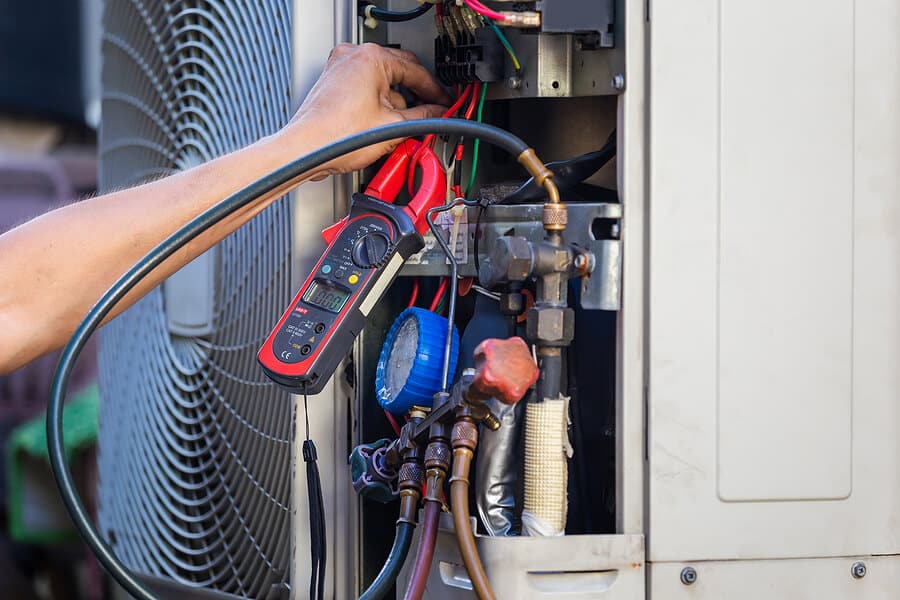Choose DMAKS HVAC for Expert and Professional HVAC Solutions.
Choose DMAKS HVAC for Expert and Professional HVAC Solutions.
Blog Article
Energy-Efficient Heating And Cooling Solutions to Save on Utility Costs
As power expenses proceed to increase, the value of energy-efficient a/c systems becomes increasingly evident. These systems not just promise considerable cost savings on energy expenses yet likewise add to a more sustainable future by reducing energy consumption. With various alternatives offered, including geothermal heatpump and ductless mini-splits, residential property proprietors encounter a wide range of choices that can enhance comfort and air top quality. Comprehending the vital functions and upkeep needs is vital to making the most of these benefits. What elements should be prioritized when selecting the best system for your demands?
Benefits of Energy-Efficient A/c Equipments
Energy-efficient Heating and cooling systems use numerous benefits that expand beyond mere price financial savings. By taking in less power, these systems contribute to decrease greenhouse gas emissions, assisting to combat climate change and advertise sustainability.
Furthermore, energy-efficient cooling and heating systems often give improved convenience levels. A lot of these systems feature innovative innovation that enables better temperature control and boosted air high quality (DMAKS HVAC). This brings about a much healthier interior environment, which is specifically crucial for people with allergic reactions or respiratory system concerns
In addition, buying energy-efficient cooling and heating systems can boost residential or commercial property value. As more customers focus on energy effectiveness, homes and buildings equipped with these systems might bring in greater quotes in the property market.
Kinds Of Energy-Efficient Cooling And Heating Options
Just how can house owners and services choose the most ideal energy-efficient cooling and heating choices for their requirements? The market supplies a selection of energy-efficient cooling and heating systems, each designed to enhance comfort while minimizing power usage.
One option is the variable cooling agent circulation (VRF) system, which effectively controls the temperature level in several zones within a structure. This system adapts its cooling agent flow to match the wanted temperature level, resulting in significant power savings.
An additional prominent selection is geothermal heatpump, which utilize the planet's stable temperature level to heat and cool areas. By moving warm to and from the ground, these systems demonstrate outstanding effectiveness, particularly in modest environments.
In addition, ductless mini-split systems offer an energy-efficient choice for homes lacking ductwork. These systems permit for zone-specific heating and air conditioning, lowering energy waste in vacant areas.
Last but not least, high-efficiency heating systems and a/c, with sophisticated SEER and AFUE rankings, offer trustworthy climate control while eating much less energy than standard models. By evaluating these options, house owners and businesses can choose an a/c system customized to their specific needs and power performance objectives.
Trick Attributes to Think About

Next, check out the kind of compressor made use of in the system. DMAKS HVAC. Variable-speed compressors can change their output to match the home heating or cooling demand, causing improved comfort and energy financial savings compared to single-speed designs. Additionally, seek systems outfitted with smart thermostats that offer programmable settings and remote gain access to, enabling much better control over power consumption
Another crucial feature is the system's air filtering ability. High-efficiency filters can enhance indoor air high quality and decrease power intake by ensuring the system operates effectively. Think about the type of refrigerant made use of; modern-day systems commonly utilize environment-friendly refrigerants that have a lower ecological effect.
Last but not least, make sure that the system works with zoning innovation, which permits customized temperature control in different locations of your home, boosting comfort while reducing energy usage.
Tips for Picking the Right System


Next, take into consideration power performance scores, especially the Seasonal Energy Performance Ratio (SEER) for cooling down systems and the Yearly Fuel Usage Efficiency (AFUE) for furnace. Greater rankings suggest higher efficiency, which can bring about substantial financial savings on utility bills over time.
In addition, evaluate the kind of a/c system that finest suits your way of living and budget plan. Choices include air conditioning, ductless mini-splits, and warm pumps, each with its own collection of advantages and drawbacks.
Do not overlook the relevance of appropriate Website installment and sizing; an inaccurately sized system can cause inefficiencies and raised wear. Finally, talk to a professional a/c professional to get professional referrals tailored to Full Article your home's special demands. This detailed strategy will certainly ensure that you select an energy-efficient a/c system that fulfills your demands and budget plan effectively.
Maintenance for Ideal Performance
Once the ideal heating and cooling system is in area, recurring upkeep becomes key to guaranteeing optimum effectiveness and longevity. A well-kept system operates much more efficiently, leading to reduced energy intake and reduced utility expenses. Regular evaluations and tune-ups ought to be scheduled at the very least twice a year-- once before the air conditioning season and as soon as prior to the heating period.

Property owners must also be vigilant concerning checking their a/c system's efficiency. Uncommon sounds, changing temperatures, or enhanced energy bills can show underlying issues that require immediate attention. By addressing these concerns without delay, home owners can avoid pricey fixings and extend the lifespan of their systems.
Investing in a maintenance plan with a qualified professional not just improves efficiency but also offers comfort, understanding that the system is running at its finest. DMAKS HVAC. Routine upkeep is consequently vital for sustaining energy performance and reducing overall operational costs
Verdict
Finally, energy-efficient HVAC systems present a feasible remedy for decreasing energy costs while improving convenience and air quality. By including advanced modern technologies and choices such as geothermal warmth pumps and ductless mini-splits, residential or commercial property proprietors can attain considerable power cost savings and add to ecological blog sustainability. Cautious consideration of system attributes and recurring upkeep even more makes certain optimum performance, making energy-efficient systems a sensible financial investment for both financial and ecological advantages.
Report this page